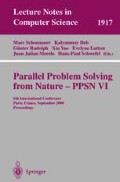Abstract
We have developed a model of foraging behaviour of a honeybee colony based on reaction-diffusion equations and have studied how communication in the hive determines this behaviour. The model utilizes two dominant components of colony’s foraging behaviour - recruitment to and abandonment of the located food source. The foraging mechanism is based upon competition of employed foragers advertising their nectar sources for pool of unemployed foragers, which is analogous to competition of species for limited resource. For replenished food sources, when an unemployed forager follows all wagle dances (advertisements) to sample the strongest dance encountered, a common “labour market” is formed, which leads to rapid selection of the most profitable nectar source. Otherwise, when unemployed foragers quickly acquire information only about some parts of environment, different niches where individuals are associated mainly with a particular “job sites” are formed, and correspondent foraging trails coexist for a long period. Our results elucidate the role of natural clustering of the dances in the small area of the have — it has to facilitate the information flow that is beneficial for overall process of colony’s food collection.
Access this chapter
Tax calculation will be finalised at checkout
Purchases are for personal use only
Preview
Unable to display preview. Download preview PDF.
References
M.R. Belic, V. Skarka, J.-L. Deneubourg, and M. Lax, J. Math. Biol., 24 (1986) 437.
S. Goss, S. Aron, J.-L. Deneubourg, and J.M. Pasteels, Naturwissenschaften, 76 (1989) 579.
S. Cazamine and J. Sneyd, J. Theor. Biol., 149 (1991) 547.
B.J. Cole, Am. Nat., 137 (1991) 244.
S. Camazine, J. Sneyd, M.J. Jenkins, and J.D. Murray, J. Theor. Biol. 147 (1990) 553.
E. Bonabeau, G. Theraulaz, and J.-L. Deneubourg, Bull. Math. Biol. 60 (1998) 753.
T.D. Seeley, The Wisdom of the Hive (Harvard University Press, Cambridge, MA, 1995).
S.A. Kauffman, The origins of order: self-organization and selection in evolution (New York; Oxford: Oxford University Press, 1993).
A.S. Mikhailov, Foundations of Synergetics I (Springer, Berlin, 1990).
J.-L. Deneubourg, S. Goss, R. Beckers, and G. Sandini, in: Self-Organization, Emergent Properties, and Learning, ed. A. Babloyantz (Plenum Press, New York, 1991) 267.
Author information
Authors and Affiliations
Editor information
Editors and Affiliations
Rights and permissions
Copyright information
© 2000 Springer-Verlag Berlin Heidelberg
About this paper
Cite this paper
Tereshko, V. (2000). Reaction-Diffusion Model of a Honeybee Colony’s Foraging Behaviour. In: Schoenauer, M., et al. Parallel Problem Solving from Nature PPSN VI. PPSN 2000. Lecture Notes in Computer Science, vol 1917. Springer, Berlin, Heidelberg. https://doi.org/10.1007/3-540-45356-3_79
Download citation
DOI: https://doi.org/10.1007/3-540-45356-3_79
Publisher Name: Springer, Berlin, Heidelberg
Print ISBN: 978-3-540-41056-0
Online ISBN: 978-3-540-45356-7
eBook Packages: Springer Book Archive

